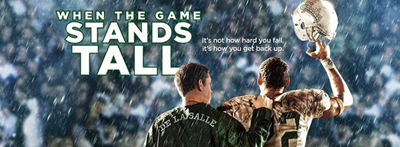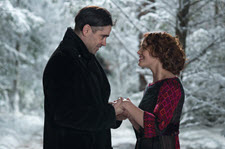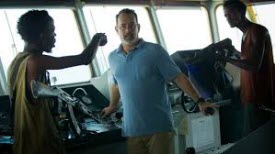I saw “When the Game Stands Tall” last night. Decent movie. Lots of football. I expected my 13 year old son to like it – I wasn’t expecting my daughters and their friends to really like it.
I will give away a big chunk of the ending so if you haven’t seen it and don’t want the ending to be spoiled…stop here. 
To me, the plot centered around Mt 23:12 – “Whoever exalts himself will be humbled, and whoever humbles himself will be exalted.”
The coach and his staff tried to plant the principles behind this verse into the football program. Team vs individual. It’s a great message – and obviously the program itself can boast some significant results. The coaching staff was consistent with the message that, participating in the program was more about preparing you to have character later in life than it was about high school football.
Participation in sports under the guidance of the right principles can develop good character; under the guidance of the wrong principles, it can develop life-destroying character defects. Mt 23:12 is one of the important principles that decides which way the scales will tip.
In the movie, one of the main characters on the team, is pursuing the state touchdown record. In the final game, the team finds themselves inside the 10yd line with an opportunity for the running back to punch it in an break the record. Instead he takes a couple knees and runs out the clock. He shared his motivation with the players on the field – something along the lines of, “This isn’t about any of us individually, it’s about the team, just like coach taught us.”
That was a powerful moment in the movie. The head coach was seriously considering leaving the high school program because he didn’t think he was making a difference in the lives of the kids anymore. This difference was being opposed by the modern day environment that strongly urges players to exalt themselves. In the movie, the act of the running back humbling himself for the team inspires the head coach to stay with the program. The act of the running back is evidence that the coach’s influence is having the desired effect.
This idea of humbling yourself is so important these days. Narcissism is one of the biggest issues facing this up and coming generation, and the social media driven world we live in can be used to further develop narcissistic tendencies.
Even our sports have become more narcissistic. You have a huge increase in individualized sports – extreme sports: skateboarding, snowboarding, BMX, wakeboarding, etc. Running, triathlons, super-triathlons, mud runs, etc. Some of these are not entirely individualized but the focus is much more on the individual than in traditional team sports.
I’m not saying that extreme sports, or marathoning or triathloning is inherently evil – all I am saying is there needs to be a specific kind of intentionality to build in the humility. When it’s all about your individual score that the judges give you on your snowboard jump/spin/flip, how do you humble yourself for the greater good of “the team”? Who is “the team”?
Of course, even today’s vision of leadership is much more narcissistic. Visionary leaders who need to recruit people to serve their own inspired vision. Again, there is nothing wrong with it, if the “humble yourself” balance is intentionally managed, and you have external accountability to make sure you are intentionally managing it.
I guess that is where the rubber meets the road. Is the principle of humbling yourself enough to motivate you to be accountable for intentionally humbling yourself on an ongoing basis?
Perhaps it has nothing to do with the “sport”, and everything to do with what systems the participant intentionally puts in place to keep himself in check from the standpoint of humility.
Back to the movie. Unfortunately, the particular plot line – the running back taking the knee instead of breaking the record – which I consider to be the main plot line, ends up being completely made up. That was not at all part of the real-life story. That’s too bad. That almost ruins the movie for me.
If the story was 100% made up, I would have really loved it. The fact that 90% of it is true, and 10% is made up really bothers me. When I reflect on why that is, it is because I am afraid that the story of my life, when it is told, will have to be 90% true and 10% made up so that it is a compelling story.
When I learn that some of the most compelling pieces of a dramatized real-life story are made up, it give me great pause and makes me reflect on the kind of life I am living.
It’s not that I think I won’t make mistakes – I already know I do. I just don’t want the main plotline of my life to be manufactured when the story is told – to make it more consistent and believable. I want my story to be told of someone whose successes and failures all drove towards the goal, or the mission in life – following Jesus and sacrificially loving others. The good and bad news is, it’s all about intentionality. The ball is in my court…





